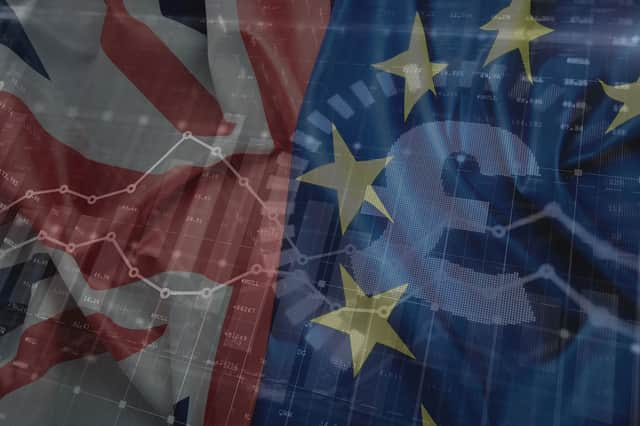How much has Brexit cost the UK economy? Goldman Sachs says leaving EU has reduced GDP by 5%
and live on Freeview channel 276
One of the main debates during the EU referendum in 2016 was about the impact that Brexit would have on the UK economy.
Remainers argued that increased friction with the Europe, our closest trading partner, would hit businesses, while Leavers hoped that the ability to sign free trade agreements around the world would negate this. So far, FTAs with Australia and New Zealand have done little to boost growth - and more than half of the UK's trade is still with the EU.
Advertisement
Hide AdAdvertisement
Hide AdAnd this trade friction is one of the reasons that Goldman Sachs, one of the world's largest investment banks, has now said that the UK's economy is 5% smaller due to Brexit. But what has Goldman Sachs said about quitting the EU and does the government agree? Here's everything you need to know.
What has Goldman Sachs said about the economy and Brexit?
The US investment bank has said the UK's gross domestic product (GDP), which is used to measure the economy, would have been 5% bigger had we remained in the EU. This is a sizable difference given the economy is currently struggling to grow, which means tax revenues are lower and there can be less investment in public services.
The study compared the UK's economy to a hypothetical one that never left the EU. Goldman Sachs said that UK goods trade has been affected, with increased friction with the EU following Brexit, as well as lower business investment.
It claimed that trade volume - the total of imports and exports - is around 15% smaller than comparable countries. NationalWorld previously reported how non-EU countries were struggling to replace trade with Europe.
Advertisement
Hide AdAdvertisement
Hide AdThe increase in non-EU migrants coming to the UK to study instead of work has also impacted this, Goldman Sachs said. The bank explained: "Analysis shows that lower EU immigration has likely played a role in exacerbating labour market tightness and thus contributed to the UK’s higher inflation rates since 2016.
“EU immigrants tended to have high labour market participation rates, as many of them entered the UK specifically to work. By contrast, many recent arrivals are students, meaning that immigration may be playing less of a role in boosting labour supply than the headline numbers suggest.”
The Leave campaign made reducing immigration the centre piece of its argument for Brexit. Recently the government announced new rules to make it harder for migrants to qualify for jobs in the UK. However, Goldman Sachs seems to think this is stymieing economic growth.
It explained: "The UK has significantly underperformed other advanced economies since the 2016 EU referendum, with lower growth and higher inflation." Last year, NationalWorld analysis of the UK statistics and international inflation data found the country was the worst-hit major European economy when it comes to food price inflation.


What has the Office for Budget Responsibility said about Brexit?
Advertisement
Hide AdAdvertisement
Hide AdIt's not just Goldman Sachs which believes Brexit has taken a huge chunk out of the UK economy. The Office for Budget Responsibility, the government's fiscal watchdog which assesses the Budget and the Autumn Statement, agrees.
Last year, Richard Hughes, the OBR chair, said that Brexit would do more damage to the economy than Covid. He said the OBR believed that leaving the EU would cost GDP by 4% in the long term.
He told the BBC: "We think that, in the long run, [Brexit] reduces our overall output by around 4% compared to had we remained in the EU."
When asked about the scale of the harm done, Hughes said: “I’ve struggled to put it in any kind of sensible context. It’s a shock to the UK economy of the order of magnitude to other shocks that we’ve seen from the pandemic, from the energy crisis.”
What has the government said about Brexit and the economy?
Advertisement
Hide AdAdvertisement
Hide AdThe government is still very bullish about Brexit, claiming that it has helped the economy. Business and Trade Secretary Kemi Badenoch recently posted a thread on X (Twitter) about an array of alleged Brexit benefits.
She said that "since 2016, we've grown faster than Germany, Italy, and Japan" and claimed that UK exports are up. She added: "The reality is Brexit is a strategy for the next few decades. We’re only four years in and it is going well. Of course there are challenges, but we are working through them."
I recently asked the Prime Minister's official spokesman about the economic impact of Brexit. He responded: "The UK has grown faster than Italy and Germany since the 2016 referendum. It's grown faster than Germany since leaving the EU in 2020.
"The IMF forecast for medium-term growth is brighter than many of our European neighbours, that includes France and Germany, and obviously Brexit provides us with freedoms that's enabling the public to access medicines faster, it's allowing farmers to get more support from the government and obviously for us to seek free trade agreements."
Advertisement
Hide AdAdvertisement
Hide AdRalph Blackburn is NationalWorld’s politics editor based in Westminster, where he gets special access to Parliament, MPs and government briefings. If you liked this article you can follow Ralph on X (Twitter) here and sign up to his free weekly newsletter Politics Uncovered, which brings you the latest analysis and gossip from Westminster every Sunday morning.
Comment Guidelines
National World encourages reader discussion on our stories. User feedback, insights and back-and-forth exchanges add a rich layer of context to reporting. Please review our Community Guidelines before commenting.
